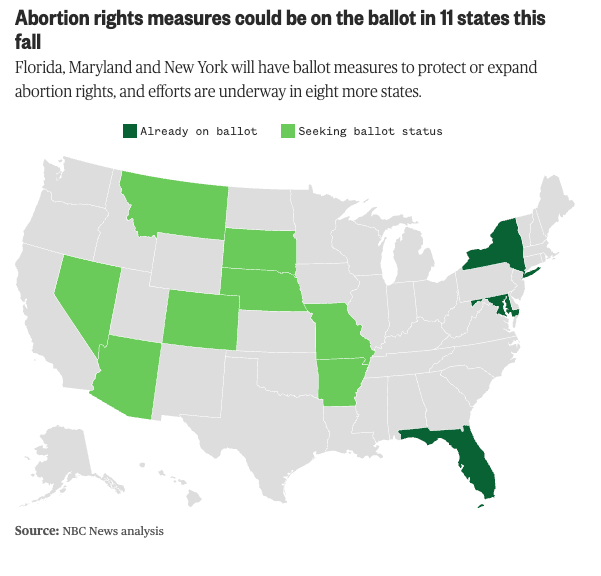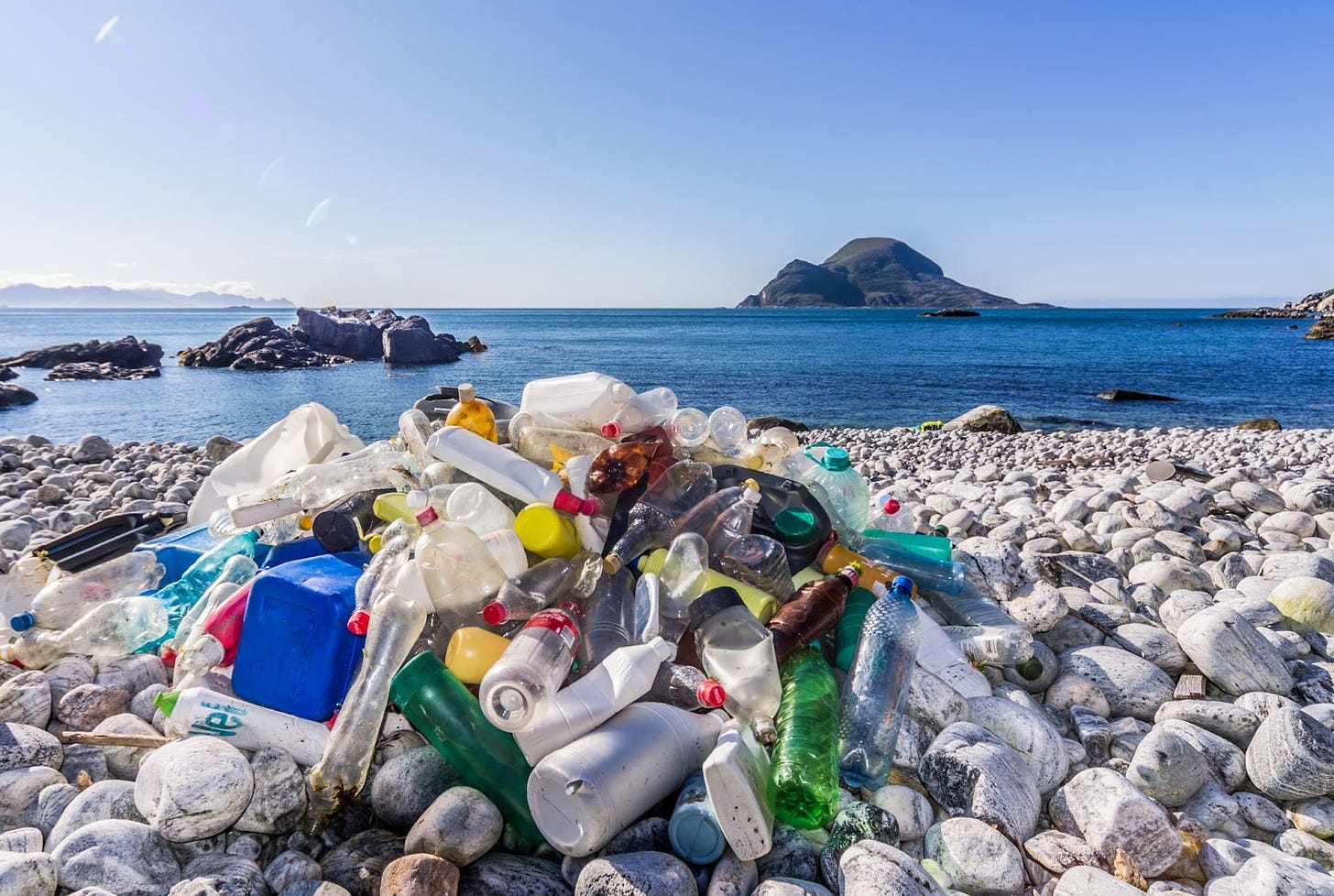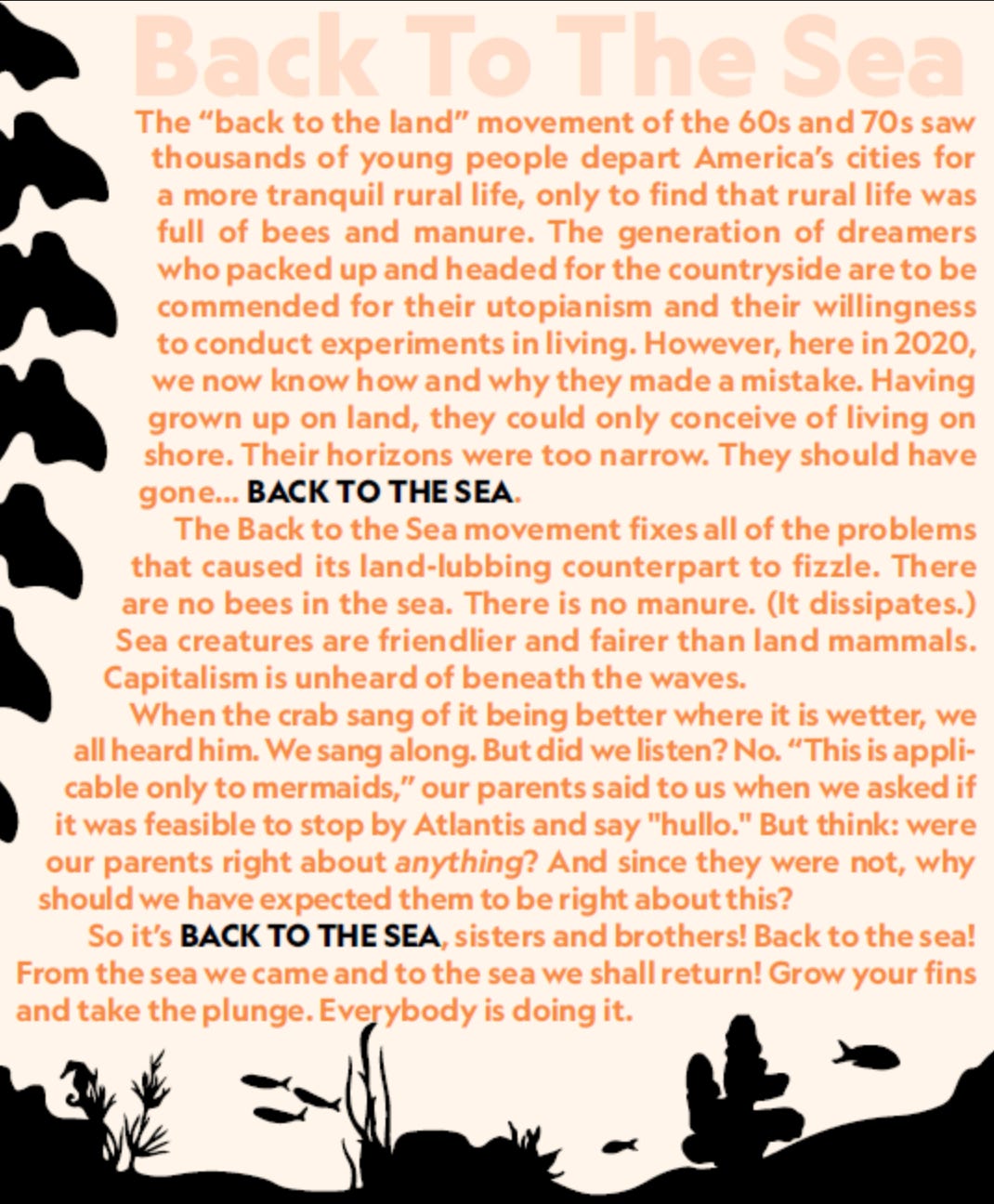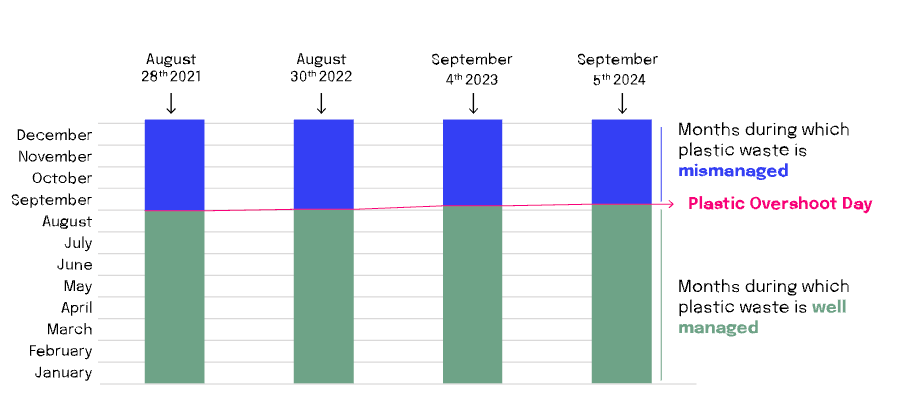Apr. 12, 2024 ❧ Embassy attacks, the IRS makes reforms, and Florida's climate denial law
Plus Puerto Rico's healthcare crisis, Obama's rhetorical gift to Trump, and intoxicated vultures
When the news hits your eye like a big pizza pie, that's a briefing
STORIES THAT SHOULD BE BIGGER
AS FLORIDA FACES MASS FLOODING, THE GOP IS REMOVING THE PHRASE “CLIMATE CHANGE” FROM ITS LAWS
The Intergovernmental Panel on Climate Change has released a projection that, in the worst-case scenario, Florida might face as much as six feet of sea level rise as soon as 2100. As human-generated climate change causes the polar ice caps to melt at an alarming clip, Miami, Tampa, and Jacksonville will be among dozens of US cities that may become submerged by rising sea levels within the next century. This is considered a longshot possibility. More likely, sea level rise will be limited to between 1.4 and 2.8 feet, which would still be catastrophic, leaving coastal cities partially flooded as soon as 2050.

But Florida’s Republican leaders don’t seem terribly concerned about stopping this from happening. Rather, they seem more concerned about preventing anyone from acknowledging why the problem exists at all. Florida Governor Ron DeSantis will soon receive a bill that would strike the majority of the mentions of the phrase “climate change” from state laws. According to The Tampa Bay Times:
The bill would repeal entire sections of law that mention climate change, such as a grant program that helps local governments and school districts reduce greenhouse gas emissions. The bill would also reduce certain regulations on natural gas pipelines, preempt local governments’ control over the location of natural gas storage facilities and make it so state agencies and local governments no longer have to consider fuel efficiency when buying vehicles, among other changes.
The state’s mission statement for energy currently acknowledges that Florida “is positioned at the front line against potential impacts of global climate change” and that “the impacts of global climate change can be reduced through the reduction of greenhouse gas emissions.” When this bill passes, all mentions of climate change and greenhouse gases will be deleted in favor of a shorter statement focused on “an adequate, reliable, and cost-effective supply of energy for the state in a manner that promotes the health and welfare of the public and economic growth.” By this, they mean an energy supply with as few renewables as possible. The bill bans offshore wind energy and limits the ability of utility companies to sell energy to people who charge their electric cars at home. The bill doesn’t prioritize energy that harms the climate, but actively seeks to marginalize and punish those who choose to consume clean energy.
It’s not enough for Florida to simply press ahead with business as usual even as the oceans bear down upon its cities. This is a full-frontal assault against acknowledging climate change in concept. This is made all the more infuriating by the fact that Florida’s leaders are clearly well aware that climate change is happening and poses a massive threat to the state. In 2021, DeSantis signed a law activating $640 million “to support efforts to ensure state and local communities are prepared to deal with the impacts of sea level rise, intensified storms and flooding.”
Why are sea levels rising? Why are there “intensified storms and flooding?” Who’s to say? Certainly not Ron DeSantis! During last year’s Republican presidential debate, when candidates were asked to raise their hands if they believed humans were causing climate change, he very sweatily tried to shut down the question entirely. Previously, he’s dismissed the idea of doing something about climate change as “left-wing stuff.” We guess he’s not wrong. Republican politicians who actually acknowledge climate change are essentially an endangered species at this point. At least they won’t be lonely: Climate change is creating thousands of other endangered species too.
AROUND THE STATES
❧ On Tuesday, the Arizona Supreme Court ruled by a 4-2 majority to uphold an 1864 law banning abortion in nearly all cases.
Before this decision, Arizona already had severe restrictions on reproductive rights, with a ban on abortions after 15 weeks. Now, its citizens have virtually no reproductive freedom whatsoever. The court’s decision is both disgraceful and absurd, because Arizona as we know it didn’t even exist in 1864. The law in question is a pre-statehood territorial one, and it was passed long before women had the right to vote, making it fundamentally illegitimate. It literally does not have the consent of the people it proposes to govern, the most important source of authority for laws of any kind.
What the law does contain is a mandatory prison sentence of 2 to 5 years for anyone who provides abortion care, and a single exception: for cases where a pregnant person’s life is at risk. Speaking to the Washington Post, Jill Habig—the president of the nonprofit Public Rights Project—warns that “We will see more women who are told to wait in the parking lot or go back home until they are sicker, closer to death, to receive health care” under the new ban.

Fortunately, there’s a movement underway to right the Arizona Supreme Court’s wrongs. As of April 2, the activist group Arizona for Abortion Access says its volunteers have gathered 506,892 signatures to put an abortion referendum on the state’s November ballot, more than 120,000 above the needed threshold. The proposed amendment to Arizona’s constitution would create a “fundamental right” to abortion care up until “fetal viability” at the 24th week of pregnancy. It would also include broad exemptions to end any pregnancy that threatens a patient’s “physical or mental health” after that point. Since Roe v. Wade was overturned in 2022, ballot measures about reproductive rights have appeared in 6 states, and the pro-abortion side has won every time—even in traditionally conservative states like Kansas and Kentucky. This year, 11 more states are trying to have votes of their own, and Florida, New York, and Maryland have already gotten the issue on the ballot. It’s notable that restrictions on reproductive rights have come mainly from unelected judges, while expansions of those rights have come directly from the collective will of the people. If that trend continues, November could be a very bad month for anyone favoring further repression.

❧ The IRS is finally rolling out its long-awaited direct file system. If you’ve ever lived outside the United States, you probably already know that the U.S. tax-filing system is a rip-off. As Ben Burgis pointed out for Jacobin a few years ago, countries like Sweden don’t require their citizens to “file” taxes at all; the government already has all the relevant information, so it just sends a brief message to each taxpayer asking if everything looks correct, to which you can answer “yes” or “no.” In contrast, the United States has given its citizens two equally annoying options: print out a bunch of forms and mail them, or pay a company like H&R Block or Intuit an exorbitant fee to file electronically.
As a consequence, for-profit tax-preparing companies have gotten extremely rich. By one journalist’s estimate, Americans spend roughly $10 billion a year at firms like H&R Block, plus an additional $2 billion on at-home tax software. (That’s an average of $210 per person.) Until recently, companies like Intuit advertised their online services as “free,” but an investigation by the Federal Trade Commission found that these claims were highly misleading. In reality, “free” software like Intuit’s TurboTax contained all kinds of hidden fees, which were only disclosed after customers had already spent a lot of time filling in their information. The FTC called this practice “egregious,” and New York Attorney General Letitia James—better known for prosecuting Donald Trump—said Intuit had “cheated millions of low-income Americans” with “deceptive marketing ploys.”
In order to protect this rich revenue stream, companies like Intuit have been doing everything in their power to stop the United States from ever developing a direct-file system like the ones other countries take for granted. As a lengthy ProPublica investigation details, Intuit has “unleashed a battalion of lobbyists” to prevent what the company calls “encroachment” from the IRS—by which Intuit means any attempt to offer a simple, free alternative to its for-profit system. It’s even gone so far as to suggest free tax-filing would harm Black Americans, a claim the authors of the relevant research reject as deceptive.
Despite all this, the IRS finally debuted its direct-file website last month—and as tax season rolls on, it’s been getting rave reviews. Taxpayers who’ve used Direct File say it only takes around 15 to 20 minutes, and that they can even file their taxes during their lunch breaks at work, completely for free. Yet again, it turns out that a state-run system without a profit motive is better and more efficient than a market-based one. Currently Direct File is only available in 11 pilot states, and only for simple tax returns. With the feedback it’s getting, that number needs to be expanded to all 50 states. Until then, thanks to a humorous redirect by some anonymous internet prankster, you can find the program at TurboTaxSucksAss.sucks.

AROUND THE WORLD
❧ There’s been a worrying trend of assaults on embassies recently. In Ecuador, police raided the Mexican embassy in Quito on April 5, shoving a diplomat to the ground before arresting former Mexican Vice President Jorge Glas. The raid was instantly condemned across Latin America, including by Chilean President Gabriel Boric, Brazilian President Luiz Inácio Lula da Silva, and even Venezuela’s Nicolas Maduro, who called it an “act of barbarism.” (When you’ve lost Maduro, you know you’ve really messed up.) As the Guardian points out, embassies are considered “inviolable” under international law, and Glas had requested political asylum in Ecuador (just as Edward Snowden once did), making the offense especially serious.
Meanwhile in the Middle East, the Israeli military has attacked and destroyed the Iranian consulate in Damascus, carrying out a missile strike on Syrian soil. Seven people, including Brigadier General Mohammad Reza Zahedi, died in the attack. If a police raid is bad, blowing up an embassy and killing its guests is a whole other level of escalation, and Iran has promised a “serious response.” It’s anyone’s guess what that means, but one possibility would be a retaliation in kind, with Iran attacking an Israeli embassy somewhere in the region. Another, more worrying option would be an assault on Israel itself, leading to regional war.
As it turns out, there’s a reason nations around the world have considered embassies off-limits for hundreds of years. Once you break the taboo on attacking them, there’s no going back, and every diplomat has to deal with a threat of violence hanging over their head. In turn, that makes diplomacy itself harder, and war more likely to break out. The world is already volatile enough as it is. Unless we want to plunge headlong into chaos, countries like Ecuador and Israel need to face serious consequences when they violate diplomatic protections, so this kind of thing doesn’t become the norm.

❧ In Germany, an employee at Munich’s Pinakothek der Moderne has been fired after hanging his own work in the museum’s contemporary art wing. According to local police, who spoke with the German paper Süddeutsche Zeitung, the artist hung his work “in the hope of achieving his artistic breakthrough.” The 55-year-old artist now faces an investigation for the relatively minor offense of property damage for drilling two holes into an empty wall. But that may be a small price to pay for his moment of exposure: “The decision was made to keep the picture on display while the gallery was open and take it down after its closing time at 6pm,” a museum spokesperson told The Guardian. Museum staff told the S.Z. that they “[do] not know what it represented.” But since this is modern art, that isn’t necessarily a criticism.
It seems that Germany is dealing with a burgeoning wave of unauthorized art-hanging (That’s certainly preferable to a wave of art theft.) Last year, a student in Bonn smuggled her painting onto the wall of the Bundeskunsthalle for its “Who We Are. Reflecting a Country of Immigration” collection, which curators only noticed once the exhibition was taken down. The museum wasn’t mad, in fact they congratulated the artist, Danai Emmanouilidis, and urged her to “get in touch!” Her painting, Georgia, soon sold for €3,696 ($4,000) at an auction.
As Joshua Zister writes in Business Insider, “The art world is famously hard to crack, often demanding not only skill but also connections and name recognition. Artists like Vincent Van Gogh were often dismissed in their own lifetimes. This incident appears to show someone going to extreme lengths to try to short-circuit that process.”

⚜ LONG READ: Puerto Rico’s healthcare system is in shambles, with doctors fleeing the US territory in droves. In The Nation, Coral Murphy Marcos writes:
Puerto Rico’s healthcare system remains notably more threadbare than that of the rest of the United States. As citizens of a US territory under colonial administration, Puerto Ricans pay Social Security and Medicare taxes just like other US residents, but they receive only around $5,119 per capita in annual federal healthcare funding, compared with $14,170 per capita at the national level. In part, this is because the federal government typically uses less generous methods to determine Puerto Rico’s funding levels than it does for the 50 states. This imbalance is pronounced in a territory where more than 40 percent of the population lives below the poverty line, a figure that dwarfs that of even the poorest states in the US, such as Mississippi’s 19 percent poverty rate […]
The number of pediatricians on the island has dropped more than 25 percent over the past decade, from 700 to 500, leaders from Puerto Rico’s top pediatric associations announced during a press conference convened last summer to address the crisis facing their specialty. An alarming 75 percent of the country’s pediatricians are over the age of 50 and approaching retirement. Medical-school graduates are leaving the island en masse for better opportunities in the United States, where the average yearly income for pediatricians is nearly double what it is in Puerto Rico. [...]
This disaster is part of a larger brain drain brought on by Puerto Rico’s decision to undergo what proved to be the largest municipal bankruptcy in US history. Oversight of the territory’s finances rests with an unelected seven-member board appointed by Congress. This body has imposed brutal austerity measures on Puerto Ricans to fulfill the public-debt obligations to bondholders, causing the cost of basic services to spike while government assistance was slashed.
NEW FROM CURRENT AFFAIRS:
“The Case for Puerto Rican Independence” by Alberto C. Medina
To this day, Puerto Rico has neither sovereignty nor political rights in the United States: island residents cannot vote for the president and have a single non-voting delegate (called a resident commissioner) in Congress. According to the U.S. Supreme Court, Puerto Rico “belongs to” but is “not a part of the United States.”
Political subordination, unsurprisingly, has led to economic precarity. If Puerto Rico were part of the United States, it would be the poorest state: median household income is about $24,000, compared to $53,000 in Mississippi, the nation’s poorest state, and $75,000 in the country overall. The poverty rate, which is less than 20 percent in every state, is over 40 percent in Puerto Rico…
Many of these trials and tribulations are direct consequences of the island’s political status. Puerto Rico was invaded and remains colonized by the United States as part of an imperialist, expansionist project. That project needs to end, and it cannot end with statehood: international law dictates that empires should free their colonial possessions—not keep them. Independence is the natural political condition of all peoples and nations, and Puerto Rico, despite the imposition of American citizenship, remains a unique and culturally distinct Latin American nation whose people deserve independence.
Nothing short of full political sovereignty—not statehood, not a continuation of the “Commonwealth” colonial status—will do.
❧ The world is on track to produce 220 million metric tons of plastic waste this year. According to a new report from the environmentalist group Earth Action, September 5 will mark Plastic Overshoot Day. That’s the point in the year when the amount of plastic being produced surpasses the ability to recycle or safely dispose of it. Last year Plastic Overshoot Day fell on September 4, and in 2022 it was August 30. This means that, while the planet is technically being helped by recycling and other waste-management strategies—and the amount it’s helped increases a tiny fraction each year—it’s still not nearly enough. As Earth Action CEO Sarah Perreard puts it, the sheer amount of plastic manufacturing “makes progress almost invisible.” This is significant because the petroleum industry has promoted the idea that recycling alone can solve the problem of plastic pollution, with no need for any further measures. But clearly that’s not true.
Instead, what’s needed are restrictions on the production of single-use plastic. Starting on April 23, several world governments are scheduled to meet in Ottawa for an important summit “to develop an international legally binding instrument on plastic pollution,” which has been long overdue. As France 24 reports, the last round of talks in Nairobi, Kenya ended in frustration, as “a small number of oil-producing nations—particularly Iran, Saudi Arabia and Russia” were able to stall the proceedings. That can’t be allowed to happen again. 220 million metric tons is a staggering amount of plastic to end up in the world’s landfills and waterways, and unless something changes dramatically, the amount of pollution is expected to double from its 2016 level by 2030. Some countries have taken impressive steps on their own, like when China banned single-use plastic bags and straws in 2021. (It helps to have a semi-Communist government.) But if we’re going to have a livable planet in a few decades, it’s clear that something more dramatic is needed: a planet-wide ban on making single-use plastic products of any kind. The closer we can get to that goal, the better.

CROOKS vs. SICKOS (or, What’s going on with our politicians?)
⚜ LONG READ: Over the last few months, you’ve probably heard Donald Trump’s fearmongering rhetoric about “military-age males” entering the U.S. at the Mexican border. But did you know it was Barack Obama who gave Trump that phrase? For Reason, Matthew Petti lays out the grim history, tracing the rhetoric back to Obama’s continuation of the so-called War on Terror:
Obama expanded the definition of "suspicious activity" to include almost any man in the wrong place at the wrong time, overseeing 10 times as many drone strikes as Bush had. Obama administration officials told the Times that "people in an area of known terrorist activity, or found with a top Qaeda operative, are probably up to no good."
The phrase "military-age males" jumped from U.S. military and intelligence circles to American politics during the Obama era, too. In late 2015, at the height of the Syrian refugee crisis, Republican politicians including Trump began claiming that the Obama administration was importing an "army" of fighting-age Syrian men. Radio host Rush Limbaugh, who had previously covered the Times revelations about Obama's targeting of "military-age males," was a major figure pushing this narrative.[...]
Immigration restrictionists, of course, don't need an Obama-era term to demonize immigrant men. But the category of "military-age males" lends an official-sounding sheen to the idea that young adults looking for work or asylum are really an army of conquest. It's encouraging everyone to look at the huddled masses through a drone's eye view.
The migration of this phrase from Obama's CIA to anti-immigration rants should be a lesson to liberals and conservatives alike. Liberals who support a hawkish foreign policy—even the kindler, gentler war on terror that Obama promised—may end up normalizing repression at home. And even conservatives who rail against the "forever wars" may allow the logic of those wars to live on, directed at the American homeland itself.

BIRD FACT OF THE WEEK
Vultures can get drunk just like humans!
Over the past weekend, an animal control cop in Watertown, Connecticut found two black vultures (scientific name: Coragyps Atratus) stumbling around behind a Dumpster. Fearing the birds had been hit by a car, they brought them to A Place Called Hope, a raptor sanctuary in nearby Killingworth. There, the caretakers discovered that the birds weren’t hurt at all; they were just extremely drunk.
As it turns out, vultures’ metabolisms allow them to get the same intoxicating effects from eating fermented fruit as humans do from wines or liquors. They’re not the only birds to do this, either. Notoriously, flocks of cedar waxwings often eat rotting berries and pass out on the ground. In the vultures’ case, the sanctuary staff suspect discarded cocktail fruit may have been the culprit.
Of course, vultures and other carrion birds play a vital role in the ecosystem by cleaning up carcasses and other decomposing material. If it weren’t for them, our world would be a lot smellier and more disgusting than it already is. Thankfully, the “dynamic duo” from Connecticut are safe now, after a “BIG breakfast” and some time to sleep it off in a crate. But when you’re throwing out trash, remember to keep your bins closed and your intoxicating substances out of vultures’ reach. As the sanctuary’s specialists say, “Birds don't let other birds fly drunk.”

Writing and research by Stephen Prager and Alex Skopic. Editing and additional material by Nathan J. Robinson and Lily Sánchez. Header graphic by Cali Traina Blume. Fact-checking by Justin Ward. This news briefing is a product of Current Affairs Magazine. Subscribe to our gorgeous and informative print edition here, and our delightful podcast here.
Current Affairs is an independent left media organization supported entirely by its readers and listeners. We offer a beautiful bimonthly print and digital magazine, a weekly podcast, and a regular news briefing service. We are registered with the Internal Revenue Service as a 501(c)(3) nonprofit organization with EIN 83-1675720. Your gift is tax-deductible to the extent allowed by law. Donations may be made through our website, via wire transfer, or by sending us a check. Email help@currentaffairs.org with any questions.








